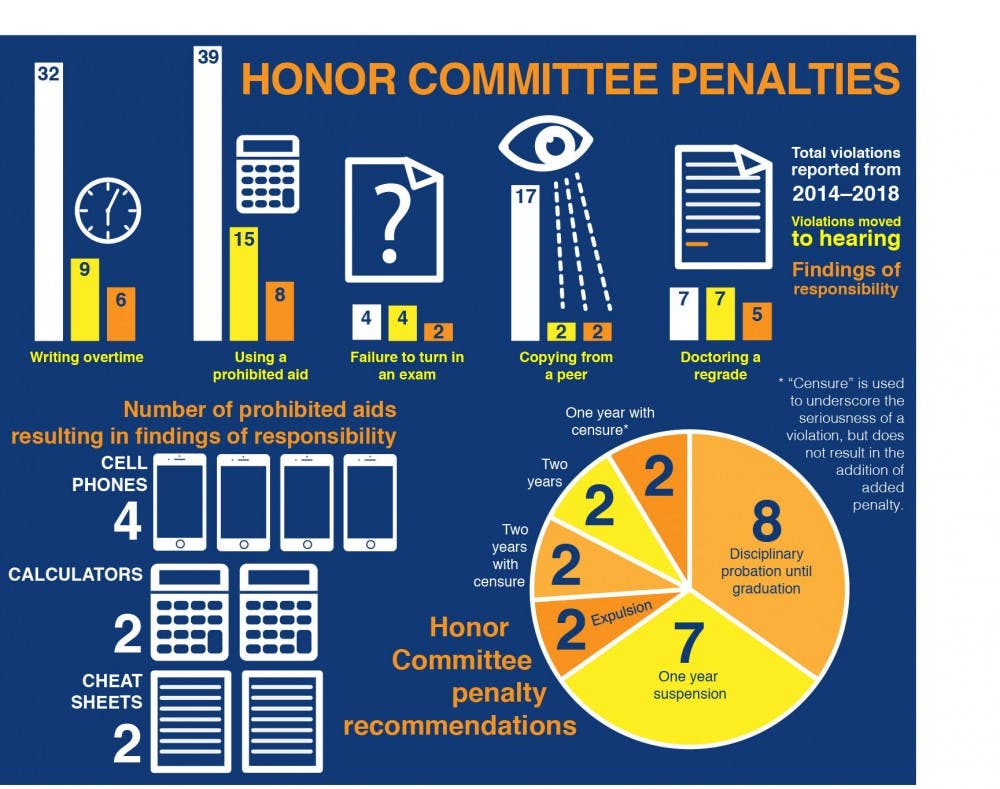On Sunday, Feb. 17, the Honor Committee released its first official report of aggregate statistics over allegations of misconduct from Fall 2014 to Spring 2018.
The Honor Committee began maintaining these statistics during the 2014-2015 academic year after the passage of a Spring 2013 Undergraduate Student Government referendum requiring the Honor Committee to publish anonymous, aggregated statistics on cases every five years.
"USG appreciates the time and effort that the Honor Committee leadership put into developing this report,” said Academics Committee Chair Olivia Ott ’20, who was also member of the Academic Integrity Report Reconciliation Committee.
In a statement to The Daily Princetonian, Honor Committee Chair Camille Moeckel ’20 stated that the Honor Committee “welcomes conversations and questions about the statistics report.”
Distributed to students in a USG email, the report entails a categorical analysis of the violations under the jurisdiction of the Honor Committee. The document details the violations reported, violations moved to hearing, and findings of responsibility under each category.
“We hope that its [the report’s] release helps to further educate students on how the Honor System operates, and believe that this is a step towards becoming more transparent and accessible,” Ott continued.
The categories of violations listed were writing overtime, use of a prohibited aid, copying from a peer, failure to submit an exam, and doctoring a regrade.
Over the last five years, among these five categories, 99 violations were reported to the Honor Committee, 37 resulted in a hearing, and 23 students were found responsible for violating the Honor Code.

That is, only about 23 percent of violations resulted in the student being found responsible for committing an Honor Code violation.
Across these 23 violations, six students were found responsible for writing overtime, eight students for using a prohibited aid, two students for copying from a peer, two students for failing to submit an exam, and five students for doctoring a regrade.
For these violations, students faced various levels of punishment. Under the Honor Committee’s “standard penalty system” as listed in the aggregate statistics, students face disciplinary probation for writing overtime and a one-year suspension for all other violations. An increased penalty, however, results when a student provides false information or a student implicates another student.
Out of the 23 students who were found guilty, eight received disciplinary probation, seven received a one-year suspension, two students received a one-year suspension with censure, two received a two-year suspension, two received a two-year suspension with censure, and two were expelled.

Censure underscores the seriousness of a violation but does not result in the addition of added penalty.
Students are allowed to appeal their decision on the basis of “procedural unfairness” or “harmful bias.” In the last five years, the Honor Committee received 16 appeals. Of these appeals, one decision was overturned, the punishments of two cases were reduced, and 13 decisions remained the same.
This report also shows that the Committee on Discipline finds more students responsible of academic violations in any given year in comparison to the Honor Committee, which only prosecutes academic violations for cases of examinations, tests, and quizzes.
According to the Committee on Discipline’s 2018 annual report, the Committee on Discipline found 39 students responsible for academic violations. All but two of these students were found guilty of plagiarism.
Of these 39 students, 10 received disciplinary probation, 26 received a one-year suspension, and 3 received a two-year suspension. No one was expelled.
Anyone with questions, comments, or concerns about the recently released report should contact the Honor Committee at honor@princeton.edu.








